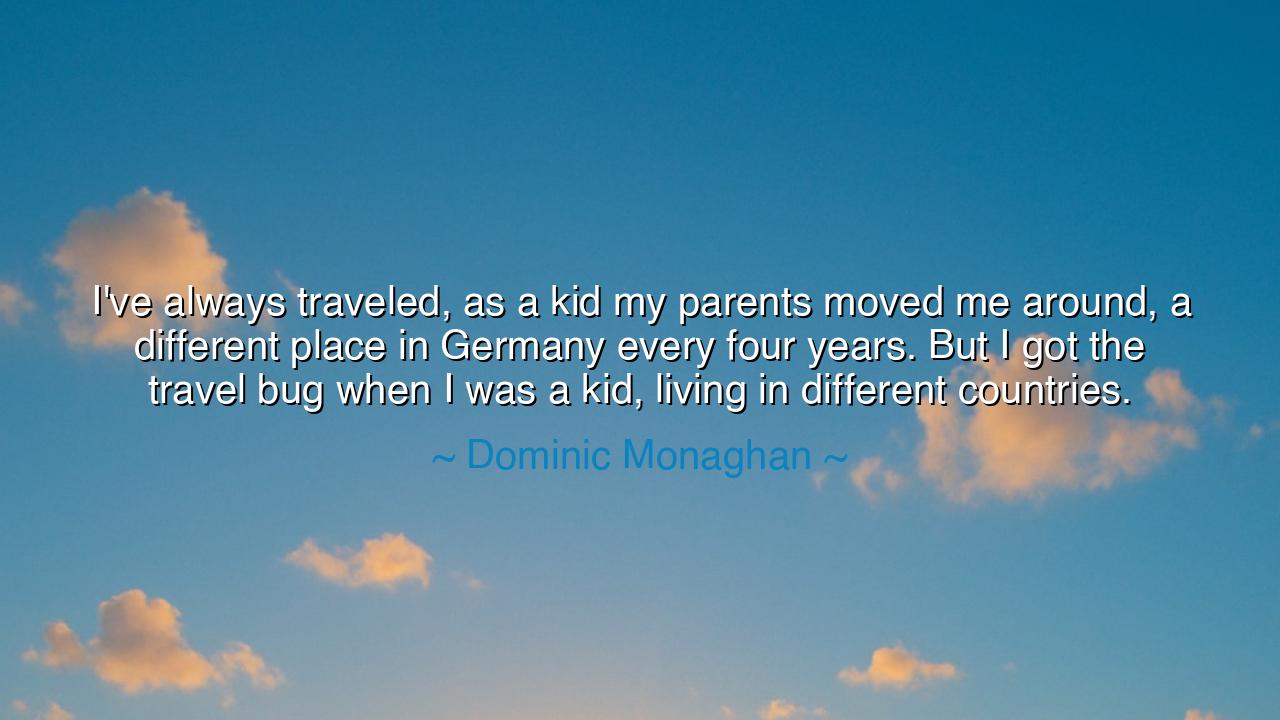
I've always traveled, as a kid my parents moved me around, a
I've always traveled, as a kid my parents moved me around, a different place in Germany every four years. But I got the travel bug when I was a kid, living in different countries.






So spoke Dominic Monaghan, actor and wanderer, when he reflected: “I’ve always traveled, as a kid my parents moved me around, a different place in Germany every four years. But I got the travel bug when I was a kid, living in different countries.” His words carry the weight of a truth both personal and universal—that the human heart, once touched by the wonders of many lands, cannot easily be satisfied with one. To live among diverse peoples, to breathe in foreign air, to walk roads far from home, is to awaken a hunger that does not fade with age but deepens, becoming a lifelong call to discovery.
The meaning of his saying rests in the shaping power of youth. The child who grows in a single village may learn depth in one soil, but the child who is moved from place to place learns breadth—the art of adaptation, the strength of curiosity, and the joy of seeing the world from many eyes. Monaghan’s travel bug was born not of luxury, but of necessity, yet from this constant change he drew a gift: a restless love of movement, a desire to know, and an openness to the unknown. Such a spirit is both burden and blessing, for it does not easily rest, yet it enriches life beyond measure.
The ancients, too, understood this. Consider Herodotus, called the Father of History, who as a boy grew restless in Halicarnassus and wandered lands far beyond his own. It was in Egypt, in Babylon, in Persia, that he found the stories that would weave the fabric of his histories. Or think of Marco Polo, who as a youth set forth across Asia and carried back not only treasures, but wisdom that expanded the imagination of Europe. Both were men whose childhoods of movement prepared them to embrace the world as a teacher, just as Monaghan’s early years in different countries planted within him the seeds of discovery.
Yet there is also in these words a quiet heroism. For to be uprooted as a child is not always easy. It means leaving behind friends, homes, familiar streets. It demands resilience. But it also teaches that the world is wide, that belonging is not confined to one corner, and that home may be found in many places. Those who learn this lesson early walk into adulthood with strength: they are at ease with difference, they are quick to learn, and they carry within them the treasure of adaptability.
History gives us countless examples of the power of this spirit. Consider Alexander von Humboldt, who, raised in shifting settings, became one of the greatest explorers and naturalists of his age. His “travel bug” led him across oceans, into jungles, and up mountains, where he uncovered truths about nature that shaped modern science. His youth prepared him, as Monaghan’s prepared him, for a life that was never content with stillness. Such is the gift of early exposure to the world: it creates souls who thirst for more, who long to seek, who hunger to know.
The lesson for us is profound. If you are given the chance to travel, embrace it, for each journey shapes the soul. If you are moved from place to place, do not mourn the loss of stability, but see the gift of expansion. And if you cannot travel far, remember that curiosity itself is a kind of journey: through books, through conversations, through opening the heart to new perspectives. For the travel bug is not only about geography—it is about the spirit’s willingness to step beyond the familiar into the vast unknown.
Practically, this means living with openness. Seek out those whose lives differ from yours. Taste foods from other lands, listen to songs in other tongues, learn the stories of those whose childhoods were not like your own. Let the spirit of travel be alive in you, even when your feet remain still. For it is not only the distance you cross that matters, but the expansion of your heart and mind.
Thus, Monaghan’s words, though simple, carry ancient truth: the child shaped by movement becomes the adult forever drawn to the horizon. May we too nurture this spirit of wonder, and may we never lose the curiosity that compels us to keep seeking. For in every journey, whether across nations or across ideas, we grow larger than we were before—and that growth, like the journey itself, is truly “never ending.”






AAdministratorAdministrator
Welcome, honored guests. Please leave a comment, we will respond soon